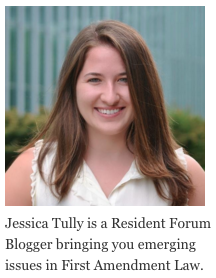A case involving a student rapper has received attention in the last few years for its implications on the First Amendment in public schools. The case has even caught the attention of rappers T.I., Killer Mike, and Big Boi, who filed an amicus brief petitioning the U.S. Supreme Court to hear the student rapper’s case.
The amicus brief is in support of suspended Mississippi student, Taylor Bell, and raises an important question: When can school officials punish a student for expression created entirely off-campus? As social media has exploded over the last decade, this question has become even more important.
“The government punished a young man for his art — and, more disturbing, for the musical genre by which he chose to express himself,” their brief states.
Bell, who was a senior back in January 2011, wrote a rap song containing some crude and explicit lyrics that accused two teacher-coaches of sexually harassing female students. Bell was suspended and sent to an alternative school for several weeks for the song, which he posted to Facebook and YouTube.
When he sued for a violation of his free-speech rights, Bell argued that he should not have been suspended because the song was created in a music studio and was never posted using school computers or on campus. The school fired back that the rap was disruptive and that one of the teachers mentioned in the song felt threatened at work.
A federal district court ruled in favor of the school officials. However, a three-judge panel on the Fifth Circuit Court of Appeals reversed the decision and found in favor of Bell. The case was then appealed to a divided full panel of the Fifth Circuit, which ruled in favor of the school officials. Several of the judges wrote dissenting opinions questioning the line between parental and school authority, with one even asking the Supreme Court to provide guidance.
Lower courts are divided on the legal standard to apply when confronted with off-campus, online student speech cases. Most lower courts apply the Tinker test, in which the Supreme Court determined that school officials can only punish students for their expressions if they reasonably believe that the expression causes a substantial disruption of school activities or invades the rights of others.
But Bell argues that the substantial disruption test from Tinker should not apply to off-campus speech. Adding support to his argument are the divided lower courts that differ on just how far school authority extends regarding off-campus speech targeted at multiple people in the school community.
“If Tinker applies to off-campus speech, schools could punish a student for expressing a controversial religious idea in church, writing a blog post against abortion, or advocating on a public sidewalk to cut the school’s football program—so long as the school could envision a substantial disruption,” Bell wrote.
The United States Supreme Court noted in Watts v. United States that hyperbole is not the same as truly threatening speech. In Bell’s case, the dissenting judges noted that many of Bell’s lyrics are more figurative than literal.
“We are going to appeal. The court did not address our argument that the references to violence in the lyrics in the song were literary in nature and could not be taken seriously,” said Bell’s attorney, Scott Colom. “The song mentioned two teachers and one of those teachers at a preliminary hearing actually said, ‘This is just music,’ and didn’t take it seriously.”
While only time will tell whether the Supreme Court will hear Bell’s case, it certainly has the makings of a case the Court will accept because of the division among the lower courts and the popularity among school students today to use social media to express their opinions. It has been nearly 50 years since the Tinker case was decided. In that time, the arena of speech has changed dramatically. As a result, it is time for the Court to address Bell’s arguments against the substantial disruption test and reconsider its own jurisprudence concerning speech in public schools.
Published January 25, 2016
